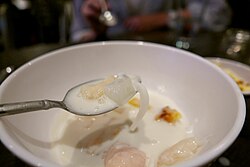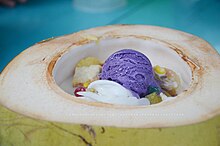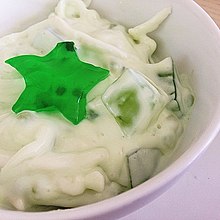Buko salad
 Buko salad with macapuno, nata de coco, jackfruit, mango, and lychee from Chicago, Illinois | |
| Alternative names | Young coconut salad |
|---|---|
| Course | Dessert |
| Place of origin | Philippines |
| Serving temperature | Room temperature, chilled |
| Main ingredients | young coconut strips, sweetened milk or cream |
Buko salad, usually anglicized as young coconut salad, is a Filipino fruit salad dessert made from strips of fresh young coconut (buko) with sweetened milk or cream and various other ingredients. It is one of the most popular and ubiquitous Filipino desserts served during celebrations and fiestas.[1][2][3][4] [5]
By changing the ratio of milk, buko salad desserts can also become beverages (usually chilled or with shaved ice), known generally as samalamig. A frozen dessert version of the dish is known as ice buko.
Variants[]
Buko salad can have many variations as it can incorporate numerous other ingredients ranging from fruits, gulaman (agar) jellies, sago, kaong, tapioca pearls, nata de coco, macapuno, and others. Some versions however are popular enough to be considered as distinct subtypes. They include:
Buko halo[]

Buko halo or buko halo-halo is a combination of buko salad and halo-halo desserts, usually served directly on a coconut shell. It differs from halo-halo in the larger amount of coconut used.[6][7]
Buko melon[]
A variant of buko salad with chunks of cantaloupes and various jelly desserts.[8]
Buko pandan[]

A popular variant of buko salad whose secondary ingredient are green gulaman (agar) cubes flavored with pandan leaf extracts.[9][10]
Buko lychee[]
Buko lychee is a combination of buko and lychee, a variant of buko salad.[11]
Lamaw[]
A popular snack in farming regions because it can be made easily with readily-available ingredients. Made with young coconut meat, milk and sugar (or condensed milk), and saltines or biscuits (also graham crackers). It can also include orange-flavored softdrinks. Usually served on halved coconut shells.[12][13][14]
Ube macapuno[]
A salad made with another common traditional pairing, that of ube halaya (mashed purple yam) and macapuno.[15][16]
See also[]
References[]
- ^ "Buko Salad Recipe". Panlasang Pinoy. Retrieved 23 April 2019.
- ^ Benayoun, Mike. "Philippines: Buko Salad". 196 Flavors. Retrieved 23 April 2019.
- ^ "Buko Salad". Pinoy Recipe at Iba Pa. Retrieved 23 April 2019.
- ^ "Buko Salad". Ang Sarap. Retrieved 23 April 2019.
- ^ Joven, Eduardo. "Buko Pandan Salad Recipe". Pinoy Recipe At Iba Pa. Retrieved 23 April 2019.
- ^ "Buko Halo-Halo". Pinoy Anik Anik. Retrieved 23 April 2019.
- ^ "Buko Halo – Halo Recipe". Panlasang Pinoy Recipes. Archived from the original on 27 June 2020. Retrieved 23 April 2019.
- ^ Joven, Eduardo. "Buko Melon Salad Recipe". Pinoy Recipe At Iba Pa. Retrieved 23 April 2019.
- ^ "Buko Pandan Salad (Filipino Coconut Pandan Dessert)". Salu Salo Recipes. Retrieved 23 April 2019.
- ^ "Buko Pandan Salad". Foxy Folksy. Retrieved 23 April 2019.
- ^ "Buko Lycheen Salad". Pinoy Recipe at Iba. Retrieved 27 November 2020.
- ^ "Buko Lamaw: The Dessert of the Visayas". bitlanders. Retrieved 23 April 2019.
- ^ De Jaresco, Bingo. "A look at coconut industry prospects". Negros Chronicle. Retrieved 23 April 2019.
- ^ "LAMAW (Lāmaw): A delectable young Coconut dessert beverage in the Philippines". busy. Retrieved 23 April 2019.
- ^ "Ube Macapuno Salad Recipe". PinoyRecipe.net. Retrieved 23 April 2019.
- ^ "Ube-Macapuno Salad Recipe". Ping Desserts. Retrieved 23 April 2019.
- Philippine desserts
- Foods containing coconut
